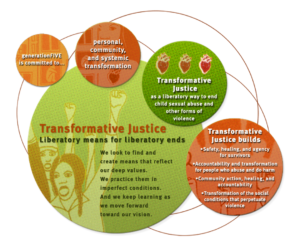Transformative Justice is a process where all individuals affected by an injustice are given the opportunity to address and repair the harm. Those affected consider and recount how an act has affected them and what can be done to repair the harm. The perpetrator is then held accountable to the individual by way of restitution.

Photo Credit: Middlebury College, Queer Studies House
APi Chaya’s Natural Helpers project and #FreeBresha are just two examples of transformative justice principles at work in communities.
Transformative Justice encourages us to reflect further by raising these critical questions:
- How do we build our personal and collective capacity to respond to trauma and support accountability in a transformational way?
- How do we shift power towards collective liberation?
- How do we build effective and sustainable movements that are grounded in resilience and life-affirming power? (Source)
- How can we shift our response to violence so that we are supporting survivors and their self-determination, as well as supporting people to fundamentally change their abusive behaviors? (Source)
In order to respond to these questions and implement these alternative practices to criminalization, it is important to identify and recognize some of the key components of Transformative Justice.
- Trauma-informed and Survivor-focused Healing: It is first and foremost essential to recognize that transformative justice practices need to support survivors by reinforcing their autonomy and self-sufficiency with trauma-informed care. Survivors must be provided options to decide what will help them in their safety, transition and healing.
- Community Accountability and Collective Action: In order to bring long-term social change,shift the culture, and transform the way we respond to sexual and domestic violence, communities can start closely examining and addressing the individual and the societal root causes that have led to these violent and oppressive environments for marginalized communities. This component not only reinforces communities to work together, foster partnership and collaboration to provide a safer and supportive space, but also encourages collective action to change risk factors leading to abusive or violent behaviors.
- Recognizing Cultural Differences- Communities working towards preventing and ending sexual and domestic violence and interested in transformative justice practices must recognize that there could be cultural differences which may have to be adapted and modified to be effective and sustainable.
Examples of Transformative Justice Practices in Communities:
API Chaya is an organization in Seattle, Washington that evolved from the need to provide culturally relevant services for survivors of domestic and sexual violence. API Chaya recognized that decades of investing in criminalization as the approach to address gender based violence had not resulted in violence declining. What emerged from this was the Natural Helpers Project. For more details on this project, click here.
Another recent example of a movement working to employ transformative justice principles pertains to the incarceration of Bresha Meadows. Bresha was arrested in July of 2016 for allegedly killing her abusive father. She is a survivor deeply impacted by domestic violence.
There is a movement known as #FreeBresha. It’s hope: getting the charges against Bresha dropped. Mariame Kaba, an abolitionist, is one of those fighting for Bresha’s freedom. Ms. Kaba notes how pro-arrest policies negatively impact survivors of violence and disproportionately affects women of color. Ms. Kaba observes that Bresha, as a victim of violence, needs to heal from her trauma. In focusing on transformative justice principles, Ms. Kaba recognizes the importance of community engagement and having structures in place to evaluate harms and address them. Inherent in the analysis is asking questions such as what happened, how did it impact those it happened to? Are there bystanders or community members who can support those harmed? And, how is the harm best repaired by the offender?
Where do we go from here?
In conclusion, API Chaya and the #FreeBresha movement provide two recent examples of transformative justice principles at work in the movement to end gender based sexual violence. It is time we engage in a paradigm shift away from incarceration and punishment which does little to address the needs of victims and frequently preys on those whom it should be assisting to. It does nothing to examine societal causes of sexually based violence, nor does it rehabilitate the offender. A move towards transformative justice principles applied in our communities can best serve the victim and the offender and address the underlying causes of criminal behavior in the first instance.
Additional Readings:
Sally Lee (2016, November 3) An Open Letter to Every Teacher who has Told a Student to Put Away a Cell Phone, retrieved from Huffingtonpost.com
Toward Transformative Justice. A Liberatory Approach to Child Sexual Abuse and other forms of Intimate and Community Violence: A Call to Action for the Left and the Sexual and Domestic Violence Sectors, Generation Five
Melissa Hellman (2017, Feb 22). This Town Adopted Trauma-Informed Care—And Saw a Decrease in Crime and Suspension Rates, YES Magazine.
Resources by Critical Resistance: Toolkits, Reports and Guides
Restorative Justice Center, UC Berkeley. Breaking the Cycle of Violence: Utilizing Community-Based Accountability Strategies to Address Sexual Violence
Sarah DeYoung. Transformative Justice Workshop Resources
Philly Stands Up: https://phillystandsup.wordpress.com/about/
** This blog was co-authored with Meghna Bhat, Training & Technical Assistance Specialist, PreventConnect.


